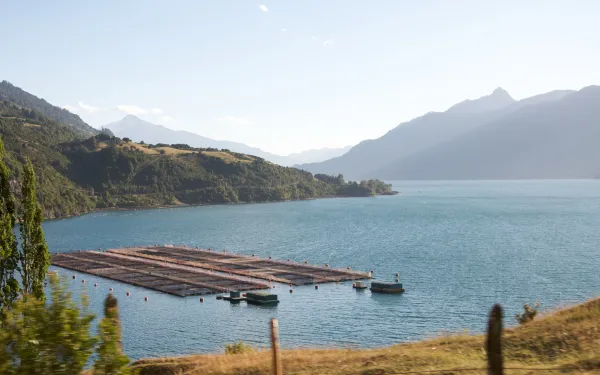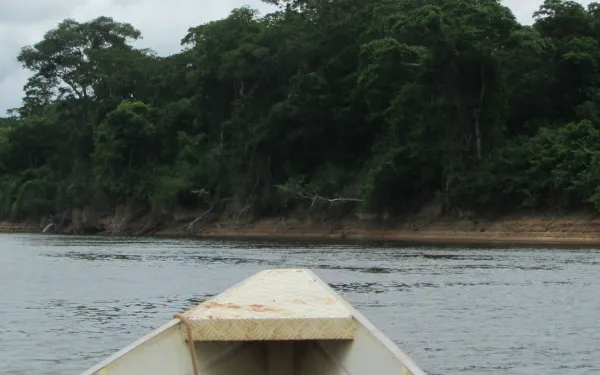
Project
Photo: Carlos AguileraProtecting the rich marine life of Cabo Pulmo Reef
Cabo Pulmo Reef, a 20,000-year-old ecological treasure in Baja California Sur, Mexico, hosts many of the 800 marine species in the Sea of Cortez.
Overfishing almost killed it in the 1980s. But the Mexican government intervened in 1995 to declare it a national park. Since then, the reef has grown, and the surrounding ecosystem has prospered.
Developers repeatedly try to build enormous tourist resorts at Cabo Pulmo. The proposed resorts typically include tens of thousands of hotel rooms, golf courses, an airport, sports clubs, and more—and require new housing development for thousands of employees.
Coral reefs like Cabo Pulmo are extremely vulnerable to the impacts of such poorly planned development. Sewage and wastewater runoff cause a surge in the growth of algae that blocks sunlight, causing the reef to bleach and die.
Fertilizers, herbicides, and pesticides from golf courses contaminate ocean currents and upset the delicate ecological balance of the area. Boating, fishing, and diving stress and break reefs, too.
In an area where water is scarce, tourism infrastructure projects could overexploit aquifers that are already suffering the impacts of climate change.
AIDA's work has been instrumental in ensuring the survival and health of Cabo Pulmo's ecosystems. We continue monitoring the situation and working with national partners to make legal protections for the reef stronger and permanent.
Partners:

Related projects

Inter-American Commission to analyze fracking’s impacts on human rights
The Inter-American Commission on Human Rights will hold an informative hearing on October 3, 2018 to better understand the situation of fracking in the Americas and the human rights violations it’s causing. The hearing is being held in response to a request brought forth by 126 Latin American organizations, united in the Latin American Alliance on Fracking. The hearing will take place in Boulder, Colorado during the Commission’s 169th period of sessions. In it, human rights defenders and representatives of affected communities will present detailed information on the documented human rights impacts, as well as the potential risks, of fracking in Latin America. The Alliance seeks to propose a series of recommendations to the Commission and governments of the region in order to guarantee human rights when faced with the exploitation of unconventional hydrocarbon reserves. According to the hearing request, there are approximately 5,000 fracking wells throughout Latin America. In Argentina, there are roughly 2,000 wells. In Chile, according to official data, 182 wells have been approved, the large majority in Tierra del Fuego. In Mexico, there are more than 3,350 fracking wells, although the signatory organizations indicated there are challenges in terms of access to this information. In Brazil and Colombia, contracts have been signed that allow for exploration and exploitation. In Bolivia, prospecting and sample studies of unconventional deposits have begun. Organizations from Argentina, Bolivia, Brazil, Colombia, Costa Rica, Chile, Ecuador, Mexico, Paraguay, Peru and Uruguay signed the request for a hearing before the Commission in July. “Fracking’s advance in Latin America is being carried out blindly because neither the chemicals used, nor their synergistic effects, nor the actual and potential risks, nor the effectiveness of mitigation measures are known with any certainty,” explained Claudia Velarde, attorney with the Interamerican Association for Environmental Defense (AIDA). “What is known is the damage fracking causes to the environment, the quantity and quality of water, and the impacts it has on health and human rights.” While fracking is promoted across Latin America, various nations, states and provinces of Europe, the Americas and Oceania have banned the technique due to the negative impacts it has had on the environment and public health. The request to the Commission emphasizes, “none of the nations where fracking has been implemented have a comprehensive knowledge of the irreversible damage it causes to the environment and the lives of individuals and communities. However, abundant scientific evidence exists on fracking’s negative impacts due to the extensive use of the technique in the United States.” Follow news from the hearing with the hashtag #AméricaSinFracking PRESS CONTACT Victor Quintanilla, AIDA (Mexico), [email protected], +521 5570522107
Read more
Calling on Chile to stop salmon industry’s impact on Patagonia
AIDA alerted six international treaties to the damages the salmon industry is causing to Chilean Patagonia, and requested that they visit the Magallanes region to investigate the impacts and urge the Chilean government to protect the region. Santiago, Chile. In an Urgent Alert to international authorities, the Interamerican Association of Environmental Defense (AIDA) requested that experts visit the Magallanes region of Chilean Patagonia—where the expansion of the salmon industry is causing serious environmental damage—and asked them to urge the government to adopt appropriate measures to address them. “These six treaties were signed and ratified by Chile to protect its natural wealth, including the endemic species of the Magallanes region,” said Florencia Ortuzar, AIDA attorney. “The government is violating these agreements by failing to prevent the salmon industry from damaging the country’s marine environments.” The document details the principal damages caused by the salmon farms in Magallanes, among them: contamination of the seabed from large amounts of fish feces, excess chemical waste, and the over-saturation of waters with fish, all of which create oxygen-free dead zones where marine life cannot survive. The alert was sent to authorities in charge of the Convention on Biological Diversity, the Convention on the Conservation of Migratory Species of Wild Animals, the International Whaling Commission, the Inter-American Convention for the Protection and Conservation of Sea Turtles, the United Nations Convention on the Law of the Sea, and the Antarctic Treaty. The situation was also reported to the Food and Agriculture Organization of the United Nations and the World Health Organization. The Magallanes region is home to many protected species, including the blue whale, the sperm whale, the Magellanic penguin, the elephant seal, the leatherback turtle, the Southern dolphin and the Chilean dolphin. A remote and pristine area, Magallanes is poorly studied and it is thus virtually impossible to understand the consequences of the industry’s current and potential impacts. “More than half the farms operating in Magallanes are causing a total or partial lack of oxygen in the waters,” explained Ortuzar. “This demonstrates that the salmon concessions are being granted without the scientific support needed to guarantee they won’t cause environmental damage.” Another problem raised in the alert is the excessive use of antibiotics in Chilean salmon farms—higher than that of any other salmon-producing nation. This excessive use provokes antimicrobial resistance in humans, a problem that has been recognized by the World Health Organization as a serious threat to global public health. In the alert, AIDA requested the international authorities: support the Chilean State in the investigation of the salmon industry’s real and potential impacts on Patagonia; remind Chile of its obligations under the treaties; investigate the damage described; and, when needed, request the application of sanctions and the suspension or cancellation of concessions in Magallanes. Consult the Urgent Alert. Find more information on the case here. press contact Victor Quintanilla (Mexico), AIDA, [email protected], +521 5570522107
Read more
In Xingu management plan, Brazil leaves communities without water
The proposed Xingu River management plan puts at risk the people, plants and animals of the Amazon region. AIDA requested that the Inter-American Commission on Human Rights urge Brazil to stop the plan and establish a socially and environmentally appropriate alternative. Washington, D.C. and Altamira, Brazil. By authorizing the construction of the Belo Monte Dam in the heart of the Amazon, the Brazilian government endorsed a management plan for the flow of the Xingu River that would leave the indigenous and riverine communities of the area without the water they need to survive. The plan is in a testing phase but is expected to be implemented next year, once all the turbines of the hydroelectric plant are installed. The Interamerican Association of Environment Defense (AIDA) sent a report to the Inter-American Commission on Human Rights detailing the serious socio-environmental risks of the plan. In it, we requested that the Commission urge Brazil to stop the plan’s implementation and create an alternative plan that guarantees biodiversity and protects the communities’ ways of life. “The authorized plan for the management of the river’s flow threatens the existence of indigenous and riverine communities, and places at risk of extinction the fish and the forests—natural resources on which the physical and cultural lives of the communities depend,” said Liliana Ávila, Senior AIDA Attorney. The plan, called a consensual hydrogram, establishes the volume of water that will pass through a specific part of the river, called the Vuelta Grande, and the part that will be diverted for energy production. It is intended to artificially reproduce the natural flow of the river in times of flood and drought. Norte Energía, the consortium in charge of the dam, proposes an average minimum flow rate of 4,000 cubic meters per second over the course of a year, and 8,000 cubic meters per second for the following year, beginning in 2019. It proposes a minimum flow rate of 700 cubic meters per second for the dry season. The report sent to the Commission, however, details scientific and social evidence that demonstrates that these water levels are significantly lower than the historical river flow and do not guarantee that fish and alluvial forests can survive the proposed reduction in the short- and medium-term. The evidence—which includes information from both the Brazilian Institute of the Environment and Renewable Natural Resources and community monitoring—also shows that some aquatic species, such as chelonians, can only feed and reproduce with minimum flows of 13,000 cubic meters per second in times of flooding, and that the volume proposed for the dry season could make the river unnavigable. “The management plan did not take into account the monitoring done by the Juruna people in collaboration with the Federal University of the State of Pará and the Socio-environmental Institute (ISA),” said AIDA attorney Marcella Ribeiro. “In 2016, with water levels higher than those proposed, communities were already reporting the mass die-off of fish.” AIDA sent the report to the Commission as part of a formal complaint against the Brazilian State for the human rights violations caused by the dam’s construction. In May, together with partner organizations, we presented our final arguments in the case, evidencing damages already caused, including the forced displacement of indigenous and riverine communities, the massive death of fish, differentiated damages to men and women, and threats to the survival of the communities. Find more information on the case here. press contacts Victor Quintanilla (Mexico), AIDA, [email protected], +521 5570522107 Isabel Harari (Brazil), ISA, [email protected], +5561998261213
Read more